- Home
- Michelle Hodkin
The Unbecoming of Mara Dyer Page 5
The Unbecoming of Mara Dyer Read online
Page 5
“Yep,” I said, fighting self-consciousness.
“Then you’re ahead of the game. We’ve just finished Oedipus Rex. Can someone—not Mara—tell me what Oedipus’ tragic flaw was?”
Noah was the only one to raise his hand.
“Twice in one day, Mr. Shaw? That’s out of character. Please, demonstrate your dazzling intellect for the class.”
Noah stared straight at me as he spoke. I was wrong yesterday—his eyes weren’t gray, they were blue. “His fatal flaw was his lack of self-knowledge.”
“Or his pride,” I volleyed back.
“A debate!” Ms. Leib clapped her hands. “Love it. I would love it more if the rest of you would look alive, but hey.” The teacher turned back to the board and wrote my answer and Noah’s on the board, under “hamartia.” “I think there are arguments to support both claims; that Oedipus’ failure to acknowledge who he was—to know himself, as it were—caused his downfall, or that his pride, or more correctly, his hubris, led to his tragic fall. And for next Monday, I want a five-page paper from each of you with your brilliant analysis of the subject.”
There was a collective groan from the class.
“Save it. Next week we start antiheroes.”
Then she continued on with her lecture, most of which I’d heard before. A bit bored, I took out my thoroughly dog-eared and well-loved copy of Lolita and hid it behind my notebook. The air conditioner in the class must not have been working, and the atmosphere grew increasingly stuffy as the minutes ticked by. When the bell finally rang, I was fiending for some fresh air. I sprung out of my seat, knocking it over. I crouched to lift it and set it right, but my chair was already in someone’s hands.
Noah’s hands.
“Thanks,” I said as our eyes met.
He gave me the same familiar, knowing look as yesterday. Slightly ruffled, I broke the stare and gathered my things before hurrying out of the classroom. A throng of oncoming students jostled me and my book fell to the ground. A shadow darkened the cover before I could reach for it.
“You have to be an artist and a madman, a creature of infinite melancholy, in order to discern, at once, the little deadly demon among the wholesome children,” he said, his British accent melting around the words, his voice smooth and low. “She stands unrecognized by them and unconscious herself of her fantastic power.”
I stood there staring, openmouthed and speechless. I would have laughed—the whole thing was sort of ridiculous. But the way he said it, the way he was looking at me, was shockingly intimate. Like he knew my secrets. Like I had no secrets. But before I could think of a reply, Noah crouched and picked up my book.
“Lolita,” he said, turning my book over in his hands. His eyes wandered over the pink-lipped mouth on the cover, then handed it to me. Our fingers brushed, and a warm current coursed through them. My heart thundered so loud he could probably hear it.
“So,” he said, his eyes meeting mine again. “You’re a smut-hound with daddy issues?” The corner of his mouth turned up in a slow, condescending smile.
I wanted to smack it off of his face. “Well, you’re quoting it. And incorrectly, by the way. So what does that make you?”
His half-smile morphed into a whole grin. “Oh, I’m definitely a smuthound with daddy issues.”
“I guess you nailed me, then.”
“Not yet.”
“Asscrown,” I muttered under my breath as I headed to my next class. I wasn’t proud of swearing at a complete stranger, no. But he started it.
Noah matched my pace. “Don’t you mean ‘assclown’?” He looked amused.
“No,” I said, louder this time. “I mean asscrown. The crown on top of the asshat that covers the asshole of the assclown. The very zenith in the hierarchy of asses,” I said, as though reading from a dictionary of modern profanity.
“I guess you nailed me, then.”
Not yet.
The words popped into my mind without permission, and I ducked into my Algebra classroom and away from him the second I saw the door.
I sat in the back, hoping to hide from yesterday’s stares and lose myself in the incomprehensibility of the lecture. I cracked Lolita’s spine and hid it under my bag. I took out my graph paper, then took out my pencil. Then exchanged that pencil for another pencil. Noah was getting under my skin. Not healthy.
But then Anna primly entered the classroom, accompanied by her not-so-little friend, and cut off my thoughts. The pair walked in like a matched set of evil. She caught me staring and I quickly looked away, but not without blushing. Out of the corner of my eye, I watched her watching me as she sat in the third row of desks.
I was flooded with relief when Jamie slipped into the seat next to me. My only friend at Croyden thus far.
“How goes it?” he asked, grinning.
I smiled back. “No nosebleeds.”
“Yet,” Jamie said, and winked. “So who else have you met? Anyone interesting? Besides me, obviously.”
I lowered my voice and scratched at my graph paper. “Interesting? No. Assholish, yes.”
The dimple in Jamie’s cheek deepened. “Let me guess. A certain unkempt bastard with a panty-dropping smile?”
Maybe.
Jamie nodded. “That blush of yours tells me it is decidedly so.”
“Maybe,” I said casually.
“So you’ve met Shaw. What did he say?”
I wondered why Jamie was so interested. “He’s an asshole.”
“Yeah, you mentioned that. Now that I think about it,” Jamie started, “that’s what they all say. And yet that boy is drowning in pu—”
“All right class, take out your problems and pass them to the front, please.” Mr. Walsh rose, and wrote out an equation on the blackboard.
“Nice visual,” I whispered to Jamie. He winked, just as Anna turned to glare at me.
My second day passed in a sea of dreary mundanity. Lectures, homework, bad teacher jokes, homework, in-class assignments, homework. When it ended, Daniel was waiting for me at the campus perimeter and I was glad to see him.
“Hey, you,” he said. “Walk faster so we can have a prayer of getting out of here before the cars clog up the only exit.” When I complied, he asked, “Second day any better than the first?”
I thought about yesterday. “Mildly,” I said. “But can we not talk about me? How was your day?”
He shrugged. “The usual. People are the same everywhere. Not many stand out.”
“Not many? So some people actually stood out?”
He rolled his eyes at me. “A few.”
“Come on, Daniel. Where’s that Croyden enthusiasm? Let’s hear it.”
Daniel dutifully gave me the rundown of his senior class, and was in the middle of telling me about a brilliant female violinist in his music study when we arrived back home. The news blared from the living room, but my parents weren’t home yet. Must be the little brother.
“Joseph?” Daniel shouted over the din.
“Daniel?” he shouted back.
“Where’s Mom?”
“She went out to get dinner; Dad’s coming home early tonight.”
“Did you do your homework?” Daniel rifled through the mail on the kitchen table.
“Did you?” Joseph asked, without looking up.
“I’m about to, but nevertheless, I’m not the one engrossed in—what are you watching?”
“CNBC.”
Daniel paused. “Why?”
“They recap the day’s market trends,” Joseph replied, without missing a beat.
Daniel and I exchanged a glance. Then he held up an incredibly thick envelope with no return address. “Where did this come from?”
“Dad’s new client dropped it off like two seconds before you got here.”
A look passed over Daniel’s face.
“What?” I asked him.
And then it was gone. “Nothing.”
He made his way to his room, and after a minute, I made my way to mine, leaving
Joseph to face the consequences of being caught watching television before doing his homework. He’d charm his way out of them in about five seconds.
Some time later, a loud knock startled me from the depths of my Spanish textbook, which I’d decided was my most hated subject. Even worse than math.
My dad peeked in through a crack in my door. “Mara?”
“Dad! Hey.”
My father walked into my bedroom, obviously tired but not at all rumpled despite spending the day in a suit. He sat down on the bed next to me, his silk tie catching the light.
“So how’s the new school?”
“Why does everyone always ask me about school?” I said. “There are other things to talk about.”
He feigned bafflement. “Like what?”
“Like the weather. Or sports.”
“You hate sports.”
“Ah, but I hate school more.”
“Point taken,” my dad said, smiling.
He then launched into a story about work, and midway through telling me about the lambasting of a clerk for wearing “hooker heels” by a judge today, my mother called us in for dinner. It was so much easier to laugh with my dad around, and that night I drifted off to sleep easily.
But I didn’t stay asleep for long.
BEFORE
I opened one eye when the pounding on my window grew too loud to ignore. The figure in my window brought his face up to the glass, peering. I knew who it was, and I wasn’t surprised to see him. I buried myself under the warm covers, hoping he’d go away.
He knocked on it again. No such luck.
“I’m sleeping,” I mumbled under my blanket.
He pounded on the glass even louder, and the old window rattled in its wooden frame. He was either going to break it, or wake my parents. Both scenarios were undesirable.
I inched over to my bedroom window and opened it a crack.
“I’m not home,” I whispered loudly.
“Very funny.” Jude opened the window, shocking me with a jet of cold air. “I’m freezing my ass off out here.”
“That problem has a simple solution.” I crossed my arms over my tank top.
Jude looked confused. His eyes were shaded under the brim of his baseball cap, but it was obvious that he was scanning my nighttime attire.
“Oh my God. You’re not even dressed.”
“I am dressed. I am dressed for bed. I am dressed for bed because it’s two in the morning.”
He looked at me, his eyes wide and mocking. “You forgot?”
“Yeah,” I lied. I leaned out the window slightly and checked the driveway. “Are they waiting in the car?”
Jude shook his head. “They’re at the asylum already. It’s just us. Come on.”
11
I WOKE IN THE MIDDLE OF THE NIGHT WITH A scream in my throat and an anchor on my chest, soaked in sweat and terror. I remembered. I remembered. The flood of recognition was almost painful. Jude at my window, there to pick me up and bring me to a waiting Rachel and Claire.
That was how I got there that night. The memory wasn’t frightening, but the fact that it existed almost was. Or maybe not frightening—maybe thrilling. I knew with everything in me that my sleeping mind hadn’t invented it—that the memory was real. I probed the edges of my consciousness for something more but there was nothing, no hint of why we’d gone.
My veins were flooded with adrenaline and I could not fall back asleep. The dream—the memory—kept replaying itself on a loop, disturbing me more than it should have. Why now, all of a sudden? What could I do about it? What should I do about it? I needed to remember the night I lost Rachel—for her sake. For mine. Even though my mother wouldn’t agree; my mind was protecting itself from the trauma, she’d say. Trying to force it was “unhealthy.”
After the second night of the same dream, the same terror, I silently began to agree with her. I was a basket case in school that day, and the day after that. The Miami breeze blew hot but I felt the frigid December air of New England on my arms instead. I saw Jude at my window when I closed my eyes. I thought of Rachel and Claire waiting for me. At the asylum. The asylum.
But with everything on my plate at Croyden, I needed, more than anything, to relax. And so it was that I focused on little details that Friday morning; the swirling column of gnats that I almost choked on when exiting Daniel’s car in the parking lot. The air swollen with humidity. Anything to avoid thinking about the new dream, memory, whatever, that had become a part of my nightly repertoire. I was glad Daniel had a dentist appointment this morning. I did not want to talk.
When I arrived at school, the parking lot was still empty. I’d overestimated the amount of time it would take to get there in traffic. Lightning flashed in distant purple clouds that spread over the sky like a dark quilt. It was going to rain, but I couldn’t sit still. I had to do something, to move, to shake off the memory that gnawed at my mind.
I threw open the car door and walked, passing more than a few empty, scraggly lots and some run-down houses. I don’t know how far I’d gone before I heard the whimper.
I stopped and listened for the sound again. A chain-link fence stood in front of me, punctuated by barbed wire. There was no grass, only light brown, tightly packed dirt and mud in places where the ground was wet with last night’s rain. Junk littered the space: machinery parts, pieces of cardboard, and some garbage. And a very large pile of lumber. Nails were scattered across the dirt.
I crept up to the barbed wire and tried to stand on my toes to see the entire expanse of the space. Nothing. I crouched, hoping to gain a different vantage point. My eyes panned over a cluster of car parts and moved across the scattered garbage to the lumber pile. The dog’s short, fawn-colored fur almost blended into the dust under the precariously stacked wood. She was emaciated, every bone in her spine protruding from her patchy coat. Curled up into a tiny ball, the dog trembled despite the oppressive heat. Her black muzzle had numerous scars, and her ears were torn, and almost invisible behind her head.
She was in really, really bad shape.
I looked for a way inside the yard but saw none. I crouched and called her to me in the kindest, highest voice I could muster. She crawled out of the pile and walked to the fence with halting, tentative steps, looking through the metal with liquid brown eyes.
I had never seen anything so pathetic in my life. I couldn’t leave her there, not like that. I would have to skip school and get her out.
That’s when I noticed the collar.
The leather collar was secured with a padlock, attached to a chain so heavy it was incredible the dog could even stand. It didn’t even need to be staked into the ground; she was going nowhere.
I petted her muzzle through the fence and tried to assess whether I could slip the collar over her large, bony head. I cooed to her, getting her to come closer so I could feel how tight it was, but just as I gained purchase under it, a nasal drawl interrupted the silence from just a few feet away.
“What the hell d’ya think you’re doin’ with my dog?”
I looked up. The man stood on my side of the fence, and he was close. Too close. It was not good that I didn’t hear him approach. He wore a stained wife-beater and torn jeans, and his long greasy hair receded into a skullet.
What do you say to someone whose dog you plan to steal?
“Hi.”
“I asked what you’re doin’ with my dog.” He squinted at me with bloodshot, watery blue eyes.
I tried to swallow my desire to bludgeon him to death with a tree limb and stalled, leaving his question hanging in the air. My options, being a teenage girl and not knowing whether this asshole had a knife or gun in his pocket, were limited.
I used my best innocent-dumb-girl voice. “I was just on my way to school and saw your dog! She’s so sweet, what kind is she?” I hoped this would be enough to deter him from pillaging me for breakfast. I held my breath.
“She’s a pit bull, ain’t you never seen one before?” He ejected a wad of s
ome foul substance from his mouth onto the dirt.
Not one that skinny. I’d never seen any dog, or any animal, that thin. “Nope. What a great dog! Does she eat much?” An obscenely stupid question. My lack of filter was going to get me killed one of these days. Maybe today.
“Whadda you care?”
Oh, well. Go big, or go home.
“She’s starving, and that chain around her neck is too heavy. She has bites on her ears and scars on her face. Is this really the best you can do for her?” I said, my voice growing shrill. “She doesn’t deserve this.” I was losing it.
His jaw clenched along with the muscles in his body. He walked right up to my face. I held my breath but didn’t move.
“Who the hell d’ya think you are?” he said, his voice a raspy hiss. “Get outta here. And if I see you ‘round here again, I ain’t gonna be this nice next time we meet.”
I inhaled without meaning to, and a noxious odor wafted in my direction. I looked down at the dog, cringing away from her owner. I didn’t want to leave her, but I couldn’t see how to get around the obstacles: the barbed wire, the padlocked collar and heavy chain. Her owner. So I tore my eyes away and began to leave.
Then I heard a scream.
When I whipped around, the dog cowered so low she hugged the ground. Her owner held the heavy chain. He must have jerked it.
The sick bastard smiled at me.
I swelled with loathing, brimmed with it. I’d never hated anyone as much as I hated him in that moment; my fingers itched with the violence they wanted to do but couldn’t. So I turned and ran, to give my trembling limbs some relief from the fury that boiled up from a dark place I didn’t know existed. My feet pounded the pavement, wishing they could trample the smile on that piece of filth’s face. And as the thought spiked through my brain, I saw it. The redneck’s skull caved in, leaving a gaping, pulpy hole in the side of his head. A thick cloud of flies clogging his mouth. Blood staining the sandy dirt by the lumber pile in a wide, darkening pool around his body.
He deserved to die.

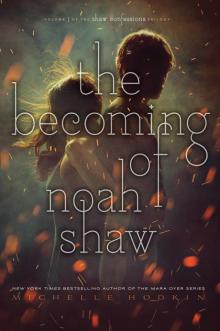 The Becoming of Noah Shaw
The Becoming of Noah Shaw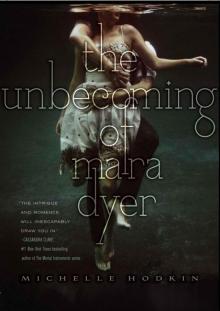 The Unbecoming of Mara Dyer
The Unbecoming of Mara Dyer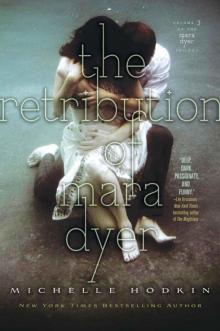 The Retribution of Mara Dyer
The Retribution of Mara Dyer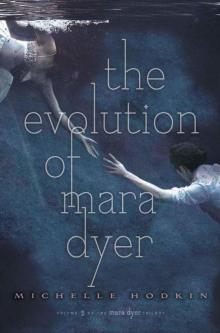 The Evolution of Mara Dyer
The Evolution of Mara Dyer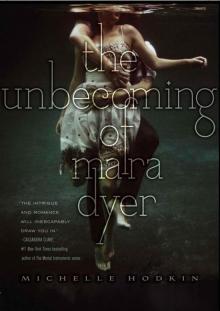 The Unbecoming of Mara Dyer md-1
The Unbecoming of Mara Dyer md-1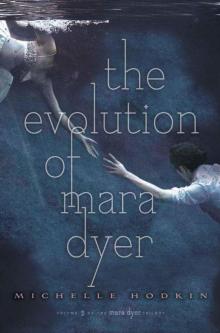 The Evolution of Mara Dyer md-2
The Evolution of Mara Dyer md-2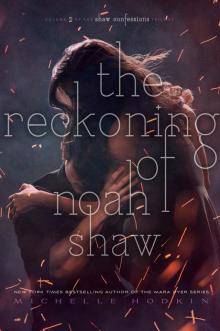 The Reckoning of Noah Shaw
The Reckoning of Noah Shaw